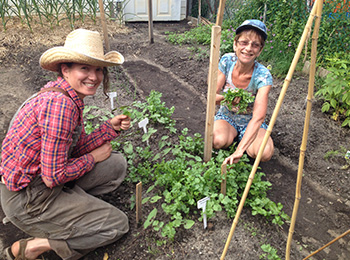TORONTO — In the living room of the Kensington Market home he’s lived in since 1927, David Pinkus, 91, watches television.
People periodically slip back and forth through the hallway that runs the length of the house – it’s the sole thoroughfare connecting the bed of wildflowers in the front yard to the vegetable garden out back.
Pinkus takes the commotion in stride.
“At my age, you can’t go into isolation. That’s the worst thing for an elderly person,” he said.
Pinkus was approached by the charitable organization Shoresh Jewish Environmental Programs last year and struck up a partnership in which Shoresh runs a community garden program out of his backyard.
Named “Maxie’s Garden” after Pinkus’ late brother, with whom used to share the Nassau Street home, the plots where the brothers once grew tomatoes are now tended for 25 weeks by about five adults who are clients of the downtown branch of Jewish Family & Child (JF&CS).
The latter has partnered with Shoresh on the initiative and is funding it, and the clients participating are typically dealing with challenges such as poverty or mental health issues.
For the second straight growing season, the group has been spending several hours each Thursday learning basic gardening skills alongside Shoresh’s director of community outreach, Sabrina Malach, and members are growing an array of organic herbs and vegetables, including basil, dill, lettuce, beans, kale, zucchini and tomatoes.
They get to take home whatever they produce.
Frances Creed, a program regular, said growing vegetables has inspired her to incorporate more fresh produce into her diet.
“I love having my hands in the earth and seeing things grow. Being around nature is really calming, and I think it’s good for our egos, because we start from nothing and grow something beautiful,” she said.
Fran Chodak, a social worker at JF&CS who often joins the clients in the garden, said the program has many benefits: it allows participants to learn new skills, get physical exercise, spend time outdoors and avoid social isolation.
“Therapy can happen in a lot of different ways,” she noted.
Malach said the program isn’t as much about food security as about “the wow factor” – that sense of being uplifted by nature.
“People are coming here feeling really heavy, really dark, really depressed, and they walk into the backyard and go, ‘Wow, look at what I planted. I made life happen. I’m alive,’” she said.
Other programs of Shoresh, whose mandate is to foster a Jewish community that embraces environmental stewardship, haven’t explicitly targeted mental health, but Malach said she’s noticed that it’s a by-product of most of the group’s initiatives, particularly those that engage seniors or children in growing food.
“Life is happening and it’s very spiritual. That’s God, to some people,” she said.
Chodak stressed that Maxie’s Garden is a “win-win” for all involved, especially when Pinkus comes out to the yard and talks to the clients.
“He knows the community, the neighbourhood and gardening so well,” she said.
Malach noted that Pinkus often knows the clients’ family lineages, “making them feel they’re part of something.”
“He’s living history,” she added, “this anchor of what’s been happening in the neighbourhood and city for the past 100 years.”
Pinkus, who worked as an engineer, has long been involved in Jewish and general community life, having volunteered with institutions such as Toronto Western Hospital and Mount Sinai Memorial Park Cemetery, where he was formerly president.
To this day, he’s president of the downtown Kiever Shul, a role he’s held since the 1970s.
“It’s always a great thing to see things planted from an embryo – a seed – grow to fruition and be used for the health of people. There are people who can’t afford to buy these products now. They’re very expensive,” Pinkus said.
Malach hopes to raise awareness of Maxie’s Garden and help people understand that, in addition to environmental programming, Shoresh is “taking hunger really seriously, and social justice.”
